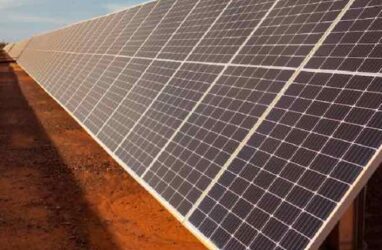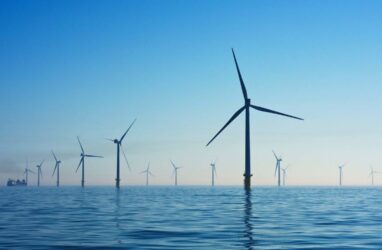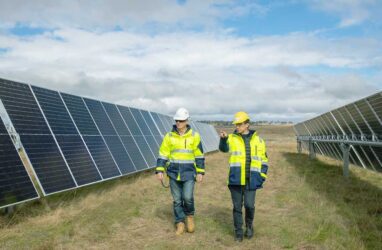Feed aggregator
I swam down Ghana’s Volta River for 40 days to show the true cost of cheap clothes | Yvette Yaa Konadu Tetteh
Secondhand clothing waste from Europe is choking the waterways of the west African country. It must not go on
My body has taught me that few things are impossible when you take your time. Sometimes I’m taken aback by how natural this has all felt to me. Since when is it “natural” to be able to swim 10km, 5km or even 2km?
How could it feel so easy to hang off the side of a boat and let go, slipping into the water, sometimes miles from the nearest land. And yet every day, for 40 days of the Agbetsi Living Water Expedition, that is precisely what I did.
Continue reading...PNG community takes project developer to court to nullify the sale of 1.3 mln credits
Fortescue signs partner to engineer transition to green energy, hydrogen and industry
 Fortescue teams up with global engineering giant to help it meet its ambitious green hydrogen and industry target.
Fortescue teams up with global engineering giant to help it meet its ambitious green hydrogen and industry target.
The post Fortescue signs partner to engineer transition to green energy, hydrogen and industry appeared first on RenewEconomy.
Our oceans are in deep trouble – a 'mountains to sea' approach could make a real difference
BlueFloat targets 7.6GW of floating offshore wind in Philippines, moves forward in Australia
 Spanish offshore wind developer unveils plans to build up to 7.6GW of floating offshore wind in the Philippines, starting in 2028, and has high hopes for Australia.
Spanish offshore wind developer unveils plans to build up to 7.6GW of floating offshore wind in the Philippines, starting in 2028, and has high hopes for Australia.
The post BlueFloat targets 7.6GW of floating offshore wind in Philippines, moves forward in Australia appeared first on RenewEconomy.
Bangladesh forced to shut biggest coal units in heatwave due to lack of coal
 A shortage of affordable fossil fuels has forced power outages across Bangladesh, including at a brand new coal plant, as temperatures soar.
A shortage of affordable fossil fuels has forced power outages across Bangladesh, including at a brand new coal plant, as temperatures soar.
The post Bangladesh forced to shut biggest coal units in heatwave due to lack of coal appeared first on RenewEconomy.
New Origin owner may outspend Andrew Forrest in Australia’s biggest renewables play: Here’s how
 New Origin owner says its renewable and storage plans will be essential if Australia is to have any chance of meeting its ambitious targets.
New Origin owner says its renewable and storage plans will be essential if Australia is to have any chance of meeting its ambitious targets.
The post New Origin owner may outspend Andrew Forrest in Australia’s biggest renewables play: Here’s how appeared first on RenewEconomy.
Warm is the new norm for the Great Barrier Reef – and a likely El Niño raises red flags
Scientists produce green hydrogen directly from seawater at offshore wind farm
 Chinese researchers produce green hydrogen at an offshore wind farm using a direct seawater electrolysis process that avoids the need for desalination.
Chinese researchers produce green hydrogen at an offshore wind farm using a direct seawater electrolysis process that avoids the need for desalination.
The post Scientists produce green hydrogen directly from seawater at offshore wind farm appeared first on RenewEconomy.
Super fund firms up as major co-investor in Tasmania green hydrogen projects
 Leading industry super fund moves a step closer to making a major co-investment renewable hydrogen projects in the pipeline in Tasmania.
Leading industry super fund moves a step closer to making a major co-investment renewable hydrogen projects in the pipeline in Tasmania.
The post Super fund firms up as major co-investor in Tasmania green hydrogen projects appeared first on RenewEconomy.
Maori forestry group fails to stop NZ ETS review document being released in High Court action
CP Daily: Tuesday June 6, 2023
“Urgent and daunting:” Brookfield boosts planned renewables spend to $30 billion
 Brookfield plays the climate card as it seeks regulatory approval for its bid for Origin Energy, saying its planned renewable spend could reach $30 billion.
Brookfield plays the climate card as it seeks regulatory approval for its bid for Origin Energy, saying its planned renewable spend could reach $30 billion.
The post “Urgent and daunting:” Brookfield boosts planned renewables spend to $30 billion appeared first on RenewEconomy.
More wildlife-friendly farming needed to stop decline of insects in Britain, says report
Populations of bees, spiders, ground beetles and hoverflies have declined twice as fast on land farmed for crops in the past 30 years, despite funding for more sustainable farming methods
Conservation measures over the past 30 years have failed to stop the decline of insects on British farmland, a new report shows. Populations of bees, spiders, ground beetles and hoverflies have disappeared twice as fast in areas intensely farmed for crops, according to the paper, which looked at citizen science data on more than 1,500 invertebrate species.
Although there was a push to intensify agriculture after the second world war, since the early 90s more sustainable and wildlife-friendly farming practices have emerged, with EU agri-environment funding made available for farmers to plant hedgerows and wild flowers, alongside better regulation of pesticides. However, these have not managed to stem biodiversity loss.
Continue reading...


